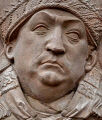Template:Selected anniversaries/February 1: Difference between revisions
No edit summary |
No edit summary |
||
| Line 3: | Line 3: | ||
||1561 – Henry Briggs, British mathematician (d. 1630) | ||1561 – Henry Briggs, British mathematician (d. 1630) | ||
||1698: Mathematician Colin Maclaurin born. He will make important contributions to geometry and algebra. The Maclaurin series, a special case of the Taylor series, will be named after him. Pic. | |||
File:Charles Camus - Cours de mathématique.jpg|link=Charles Étienne Louis Camus (nonfiction)|1767: Mathematician and crime-fighter [[Charles Étienne Louis Camus (nonfiction)|Charles Étienne Louis Camus]] publishes updated edition of ''Cours de mathématiques'' with new section on the detection and prevention of [[crimes against mathematical constants]]. | File:Charles Camus - Cours de mathématique.jpg|link=Charles Étienne Louis Camus (nonfiction)|1767: Mathematician and crime-fighter [[Charles Étienne Louis Camus (nonfiction)|Charles Étienne Louis Camus]] publishes updated edition of ''Cours de mathématiques'' with new section on the detection and prevention of [[crimes against mathematical constants]]. | ||
Revision as of 19:21, 8 April 2018
1462: Polymath Johannes Trithemius born. He will be remembered as a lexicographer, chronicler, cryptographer, and occultist.
1767: Mathematician and crime-fighter Charles Étienne Louis Camus publishes updated edition of Cours de mathématiques with new section on the detection and prevention of crimes against mathematical constants.
1893: Thomas A. Edison finishes construction of the first motion picture studio, the Black Maria in West Orange, New Jersey.
1903: Physicist and mathematician Sir George Stokes, 1st Baronet dies. He made seminal contributions to fluid dynamics (including the Navier–Stokes equations) and to physical optics.
1934: Mathematician, philosopher, and crime-fighter Imre Lakatos uses his thesis of the fallibility of mathematics and its 'methodology of proofs and refutations' in its pre-axiomatic stages of development to detect and prevent crimes against mathematical constants.
1944: Pultizer Prize awarded to Field Report Number One (Peenemunde edition).
1976: Physicist and academic Werner Heisenberg dies. He introduced the uncertainty principle -- in quantum mechanics, any of a variety of mathematical inequalities asserting a fundamental limit to the precision with which certain pairs of physical properties of a particle can be known.
1976: Mathematician Bertram Kostant uses geometric quantization to detect and record the electroquantum afterlife of Werner Heisenberg.







